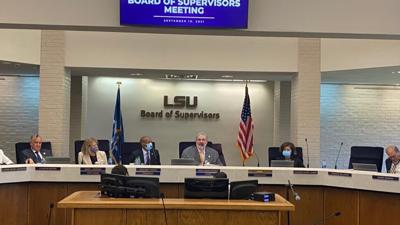Tucked quietly into a recent LSU Board of Supervisors’ agenda was a resolution to abolish the Faculty Council, which had voted overwhelmingly to mandate the COVID-19 vaccine in its first meeting in years this May.
University leaders have spent months ignoring repeated health concerns from faculty and staff—anxieties that only amplified as the Delta variant tore through a largely unvaccinated Louisiana. Lackluster pandemic protocols have left many on campus—faculty, staff and students—to question what regard, if any, the administration has for their health and safety.
An attempt to silently destroy an arm of faculty governance is particularly troubling at a time where many professors have made desperate pleas concerning workplace safety.
Altering the structure of faculty governance is a major proposal that should require the consultation and endorsement of those it represents. Instead, faculty only learned of the resolution the night before the Board meeting, and many didn’t hear of it at all.
Professor Robert Mann of the Manship School of Mass Communication spoke in opposition to the resolution at the Friday morning Board meeting.
“This is happening only a few months after an overwhelming percentage of the Faculty Council voted for a COVID vaccine mandate,” Mann said. “The Council has existed for decades, but just months after more than 700 of its members asserted themselves on behalf of this school and the Baton Rouge community, you are planning to abolish that council?”
He went on to ask, “If you assert—as I suspect that some of you will—that this is a harmless or even helpful reorganization of faculty governance, then why did you fail to involve the faculty?”
President William Tate stated he didn’t propose the resolution, but he did defend it, saying the design of the two faculty bodies — the Faculty Senate and the Faculty Council — was “very confusing” and that he’d “never seen anything like this before.”
“I do think there is a need for greater clarity about who actually is the faculty representative body,” Tate said in response to Mann. “And for me, quite frankly, that clarity is mandatory if I’m gonna actually govern with you. Because it is not clear who I am governing with in light of the way we’re designed.”
Tate admitted faculty should have been consulted in this resolution but continued to defend it by claiming he’s not even sure to which body the resolution should have been brought.
This cuts to one of the things that made this resolution so bizarre — if the Board was truly confused about which body to engage with, how is erasing one of those bodies from university regulations without faculty consultation any sort of solution?
And it’s still not entirely clear where this confusion comes from.
The Faculty Senate is a smaller elected representative body, whereas the Faculty Council includes “all full-time members of the faculty” as voting members. The Council, Mann explained, is an avenue to check Senate power, if needed.
Would we eliminate the U.S. House of Representatives if the president found bicameral legislature too confusing?
The May meeting of the Council is a perfect example of its distinct purpose: to capture the will of a large swath of faculty. The Council hadn’t met for years until it voted to mandate the COVID-19 vaccine. That vote allowed the faculty to prove forceful support for a mandate and echoed an earlier resolution of the Senate (though, unfortunately, these resolutions were largely disregarded by the university).
Claims that these two bodies are simply too confusing to coexist are worthy of heavy skepticism. No one on the Board took issue with the organization of faculty governance until the Faculty Council voted forcefully in favor of a policy the administration had no intention of supporting.
Though the resolution was tabled for the time being, its proposal only further erodes the strained relationship between faculty and the administration.
Faculty shouldn’t have to beg for adequate workplace conditions, and they shouldn’t be informed of proposed changes to faculty governance as an afterthought.
Tate’s goal of a “scholarship first” university is a noble one. But it will not be achieved if the administration continues to undermine the trust of its faculty.
Claire Sullivan is a 19-year-old coastal environmental science sophomore from Southbury, CT.


